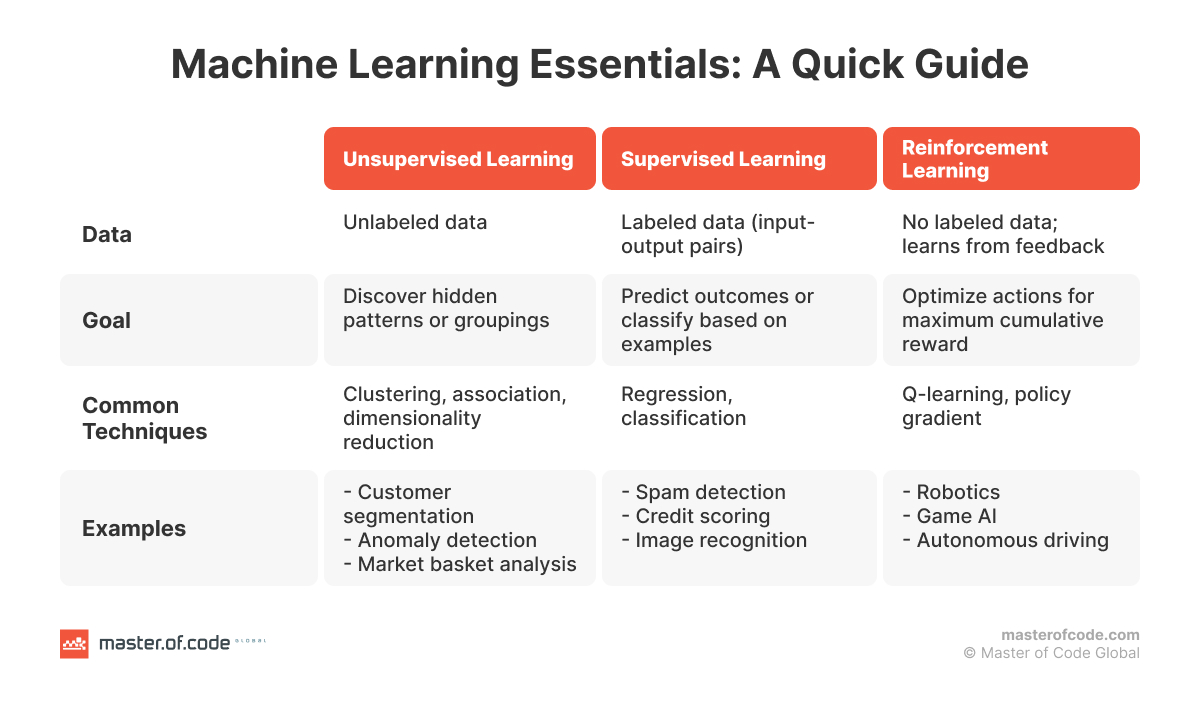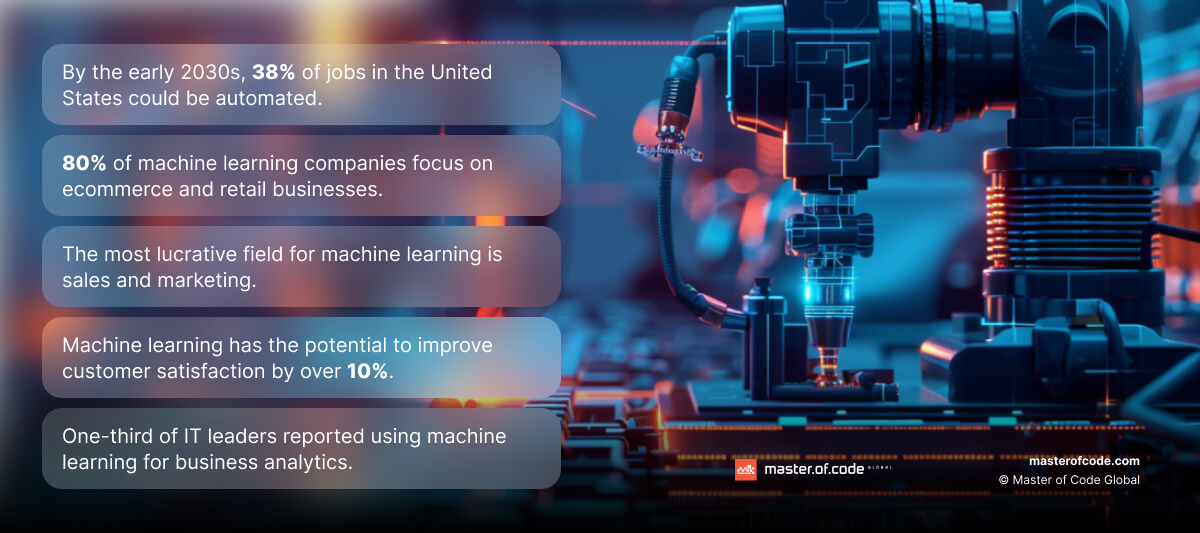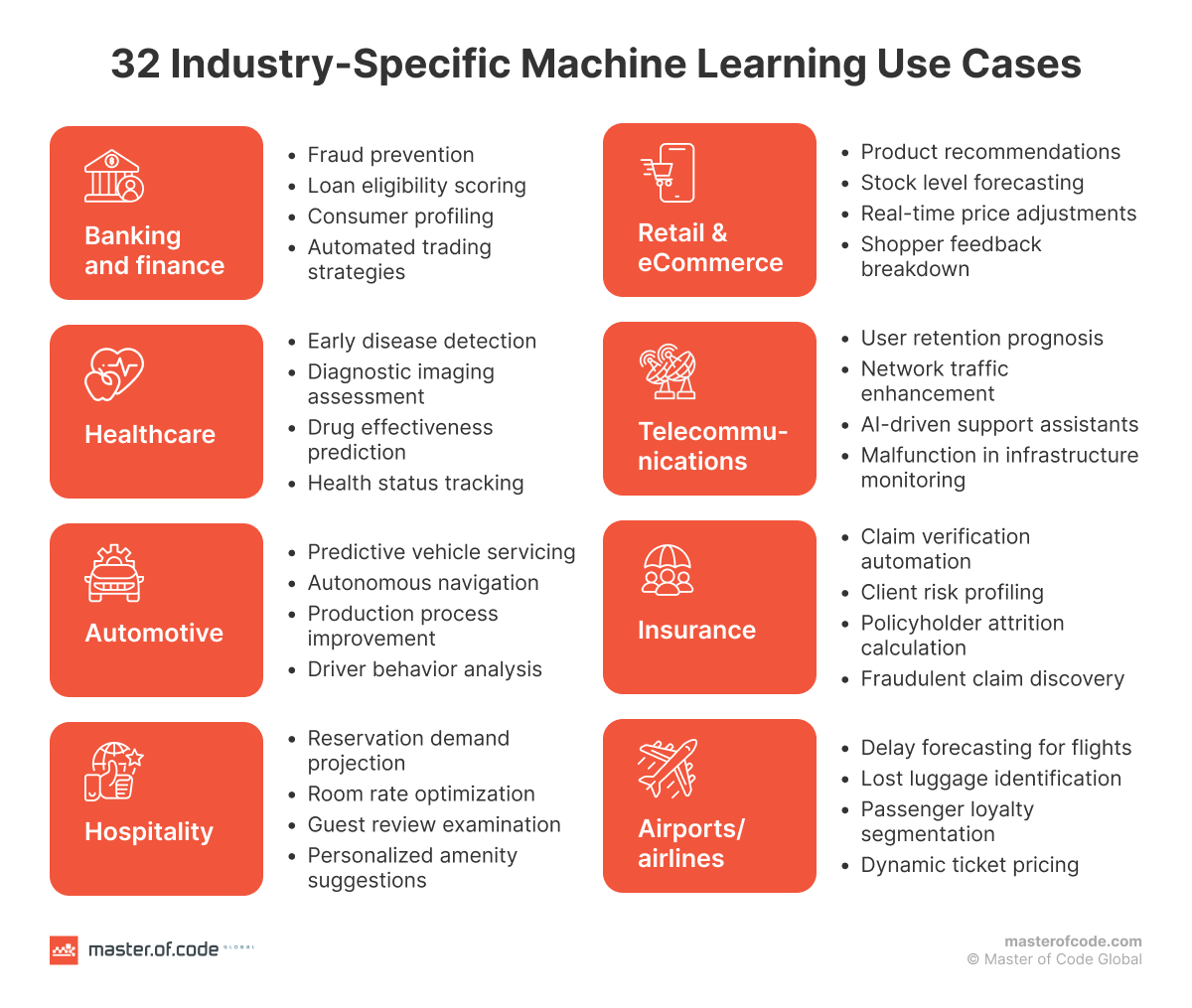Have you ever heard of machine learning (ML)? Probably yes as it’s been making waves in the tech world for a while now, proving itself as a powerful answer to countless challenges. But are you aware of just how life-changing it can be for your brand?
Are you struggling with any of these common pain points:
- Losing customers to competitors;
- Drowning in data but lacking actionable recommendations;
- Falling behind in the race for innovation;
- Inefficient operations draining your budget?
ML offers a solution. It’s like having a secret decoder ring for your company, revealing hidden patterns and opportunities within your insights. Intrigued? We invite you to explore the potential of this technology across 10 top use cases and its impact on major industries.
In this article, you’ll discover how to:
- Understand your clients better than ever before;
- Optimize pricing and inventory for maximum profitability;
- Enhance operational efficiency and reduce costs;
- Strengthen security and protect your valuable assets.
Excited to unlock the benefits of machine learning in business? Let’s get started!
Table of Contents
ML Algorithms: How They Work and Why They Matter
For some people, this technology might sound like something out of a sci-fi movie, but it’s actually quite straightforward. At its essence, it’s all about enabling computers to learn from data, just as humans do, but at an incredible speed and scale. Instead of being explicitly programmed for every scenario, such algorithms allow machines to adapt and improve their performance over time by recognizing patterns and making evidence-driven forecasts.
Consider it akin to teaching a child to ride a bike. You can explain the concept, but ultimately, they learn through trial and error, adjusting their balance and coordination until they can cycle smoothly. Similarly, machine learning systems develop by analyzing vast amounts of information, identifying trends, and refining their predictions through a process of continuous feedback and improvement.
There are three main types of ML:

- Unsupervised Learning
Picture a child sorting a box of toys. They might group similar items together – cars with cars, blocks with blocks – without any prior knowledge or labels. That’s essentially what unsupervised learning does. It allows computers to identify patterns and structures in data without any pre-existing categorization or guidance. This is particularly useful for tasks like customer segmentation, anomaly detection, and pinpointing hidden relationships within complex datasets. - Supervised Learning
Now envision you’re teaching the child to recognize different fruits. You show them an apple and say, “This is an apple.” You repeat this with various objects, providing titles and examples. That’s supervised learning in action. The algorithm develops from labeled insights, where the desired output is already known. The result is an ability to make prognoses or classifications on new, unseen facts. This type is widely used for image recognition, spam filtering, and predicting client churn. - Reinforcement Learning
Think of training a dog with treats. When it performs a desired behavior, it receives a reward. Step by step, the dog learns to associate specific actions with positive outcomes. Reinforcement learning operates on an identical principle. It interacts with an environment and obtains feedback in the form of rewards or penalties. Effective for things involving decision-making in unpredictable environments, it finds applications in diverse fields, e.g., game playing, robotics, and autonomous vehicle control.
Machine Learning Use Cases in Business You Need to Know
Now that we’ve explored the ML types, let’s dive into how these powerful tools can be applied to solve real-world challenges and open doors to new opportunities.
Sentiment Analysis for Superior Customer Service
ML is giving chatbots a serious upgrade, allowing them to not only understand user questions but also feel their emotions. Sentiment analysis algorithms enable these bots to gauge whether your buyers are happy, frustrated, or somewhere in between, so the assistants can tailor their responses accordingly. This means quicker resolutions, smoother interactions, and happier customers. In fact, according to Statista, 57% of businesses are already using technology to enhance the consumer experience.

Luxury Escapes Chatbot
Speaking of satisfied shoppers, let’s jet over to the travel industry. Master of Code Global, a machine learning development company, designed a bot for Luxury Escapes to provide personalized destination recommendations and booking services. This resulted in a 3x higher conversion rate than their website, generating over $300,000 in revenue within the first 90 days. The tool also achieved an impressive 89% reply rate for retargeting messages, proving that a little bot can go a long way in engaging customers and driving sales.
Predictive Power of Recommendation Engines
In the world of eCommerce, it’s not enough to simply offer a vast selection. Buyers crave personalized experiences, and that’s where recommendation algorithms shine. These intelligent systems analyze user behavior, purchase history, and preferences to propose products or content that truly resonate. Think of it as a digital matchmaker, pairing consumers with things they’re most likely to adore. And the results speak for themselves: research indicates that a well-crafted ML-powered suggestion solution can boost conversion rates by an average of 22.66%!
Amazon Inc.
The undisputed ruler in this regard is Amazon. Their recommendation engine is a marvel of machine learning, constantly analyzing browsing records, purchases, and even those lingering glances at product pages to suggest items one might enjoy. This not only enhances the CX but also drives sales and strengthens loyalty, making the brand a true force in the online retail arena.
Agile Pricing for a Changing Market
Forget fixed costs! With machine learning fueling adaptive pricing, businesses can modify rates in real-time based on factors like requests, competition, and even the weather. Such responsiveness allows for maximized revenue, optimized inventory, and a competitive advantage. In fact, McKinsey’s study shows that dynamic pricing can propel sales increases by 2-5% and margin growth by a whopping 5-10%!
Uber
Speaking of agility, let’s hail Uber and see the approach in action. Ever noticed how prices surge during rush hour or special events? That’s the brand’s ML algorithms at work, scrutinizing demand fluctuations and driver availability to adjust fares accordingly. The strategy ensures that clients can find a ride when they need it most and incentivizes drivers to hit the road, creating a win-win situation for both parties.
Data Analytics and Hidden Customer Insights
Artificial intelligence transforms raw client data into actionable gold. By examining past behavior and demographics, brands can predict churn, segment audiences with laser precision, and forecast future deals. The result? Companies personalize marketing campaigns, optimize resource allocation, and forge stronger relationships with the target audience. In fact, as per McKinsey, organizations using customer analytics intensively are 23 times more likely to outperform competitors in acquiring new buyers. This just captures how valuable evidence-backed insights can be!
Intelligence-Infused Forecasting
Tired of relying on guesswork and intuition? Advanced AI applications enhance forecasting accuracy, enabling businesses to anticipate emerging trends with remarkable reliability. Whether it’s anticipating demand, optimizing stock, or making strategic decisions, ML frameworks interpret historical facts to uncover patterns and provide practical foresight. And the payoff is significant: Firms employing AI for such purposes reduce errors by at least 20%, with some achieving a reduction of 50% or more.
Savvy Threat Detection and Fraud Prevention
In today’s digital landscape, security threats lurk around every corner. But there’s no reason to panic! Machine learning technology is your vigilant guardian, tirelessly working to detect and prevent fraud and cyberattacks. These interfaces analyze volumes of information, spotting anomalous behaviors that might signal malicious activity. Whether it’s fraudulent payments, phishing attempts, or malware attacks, ML provides a proactive defense to your business. Research from the University of Jakarta highlights the effectiveness of these mechanisms, demonstrating a superb 96% accuracy in minimizing fraud.
PayPal
A great illustration of this technology at work is how PayPal’s sophisticated system analyzes billions of transactions, identifying suspicious activities and protecting both buyers and sellers. This not only reduces financial losses but also builds trust and confidence in the platform, making the giant a leader in secure online payments.
AI-Powered Tools for Human Resources
Wave goodbye to tedious admin tasks and say hello to strategic HR! Intelligent tools are revolutionizing human resources, with automation helping HR managers make well-considered choices. In fact, 38% of leaders are already exploring or implementing such solutions to boost efficiency within their organizations. From finding the perfect candidates and predicting employee turnover to analyzing performance and determining training needs, these powerful instruments free up HR teams to focus on building a thriving and engaged workforce.
Seamless Operational and Supply Chain Optimization
Machine learning applications in business play the role of conductors orchestrating a symphony of efficiency across your operations and procurement functions. It predicts demand with uncanny exactness, optimizes supplies to perfection, streamlines transportation, and even anticipates equipment failures before they happen. Early adopters of this tech have seen incredible improvements: 15% lower logistics costs, 35% leaner inventory, and a staggering 65% rise in service levels.
Walmart
Take for example Walmart. Their AI-centric management infrastructure smoothly connects over 4,700 stores, fulfillment centers, and distribution hubs, ensuring shelves are always stocked and customers never leave empty-handed. But the magic doesn’t stop there. The enterprise also uses artificial intelligence to improve its delivery network, matching drivers and orders to ensure timely and efficient deliveries.
Enhanced Decision Support Systems (DSS)
Swamped by data but thirsty for insights? ML-assisted implementations are redefining DSS, providing executives with the clarity they crave. Indeed, 96% of directors believe that AI can enrich their judgments. No more gut feelings and guesswork! Intelligent solutions decode vast datasets, identify tendencies, and offer predictive hints, empowering managers to guide business with confidence. With 63% of them spending over 40 hours a week on decisions, imagine the time and resources that can be saved with technological support.
Massachusetts Institute of Technology
Let’s turn our attention to the healthcare sector, where MIT researchers are enhancing decision-making in critical care units. Their innovative ICU Intervene studies patient records to predict necessary interventions, allowing doctors to manage cases with greater speed and accuracy.
Upgrade in Predictive Maintenance
No more rushing to repair unexpected malfunctions! Machine learning in manufacturing spots early signs of machinery breakdowns before they cause costly interruptions. Sensors and intelligent algorithms work together to monitor system health, pinpoint potential issues, and schedule upkeep precisely when it’s needed. The outcome is minimized downtime, higher productivity, and a decline in expenses. Deloitte research shows that predictive strategies can decrease problems by 70%, increase efficiency by 25%, and lower service costs by 25%.

Ford Motor Company
Let’s see this modification on the factory floor. Ford employs it to fine-tune its assembly lines, streamlining production flow and maximizing output. This has led to substantial increases in the creation of their electric vehicle, demonstrating the power of automation to drive advancement in the industry.
Real-World Results: ML’s Impact on Different Sectors
Given that we’ve grasped the essential applications of machine learning in business, let’s set out to discover how this technology is benefiting various fields.
Banking & Finance
ML empowers financial institutions to proactively combat fraud and fortify protection measures. Through advanced anomaly detection, suspicious activities are identified and neutralized in real-time, safeguarding customers’ assets. Beyond security, ML acts as an intelligent advisor, crafting bespoke investment strategies and optimizing portfolios for higher profitability. The technology also accelerates loan approvals, ensuring regulatory compliance while minimizing delays.
Retail & eCommerce
Bid farewell to cookie-cutter shopping experiences and embrace a world of hyper-personalization. Machine learning allows retailers to decipher clients’ unique tastes and curate offers they’ll adore. A visual search function simplifies product discovery, while price optimization guarantees clients secure the most favorable deals. Behind the scenes, ML fine-tunes inventory and streamlines supply chains, securing swift delivery of the desired items.
Healthcare
With intelligent interfaces, diseases are detected earlier and therapy becomes more effective. Smart algorithms can also scrutinize medical images with unparalleled accuracy, pinpointing subtle indicators of illness that may elude human observation. This tech facilitates the creation of individualized treatment regimens, adjusted to one’s distinct genetic makeup and health history. Furthermore, ML is expediting the development of critical medications, offering hope to patients worldwide.
Telecommunications
Enjoy uninterrupted connectivity and smooth communication with the aid of artificial intelligence. Telecom providers are relying on this technology to upgrade network functioning to keep consumers connected wherever they venture. Say adieu to frustrating service interruptions and welcome proactive maintenance that anticipates and resolves issues before they disrupt the connection. ML also enables curated service recommendations, tailoring plans to the precise requirements while fortifying network security with robust fraud prevention benchmarks.
Automotive
Picture vehicles that expertly navigate intricate locations autonomously, maintaining safety and eliminating accidents. ML is not only propelling self-driving cars but also augmenting conventional automobiles with sophisticated driver-assistance systems that elevate every journey. Beneath the surface, it is refining vehicle performance, maximizing fuel efficiency, and forging a path towards a more environmentally friendly sector.

Insurance
Machine learning is bringing clarity and precision to this industry, rendering it more customized and dependable than ever. Receiving policy tips precisely aligned with one’s particular needs and risk profile, guaranteeing clients possess the appropriate coverage at the most competitive price is just the tip of the iceberg. Advanced solutions are also diligently identifying fraudulent claims, shielding both insurers and honest policyholders. With streamlined underwriting procedures and enhanced catastrophe threat assessment, ML is strengthening the effectiveness of operations and bolstering disaster preparedness.
Hospitality
The guest experience is rewritten through tailored suggestions for accommodations, amenities, and activities that align with personal choices. Dynamic pricing ensures guests obtain the utmost value for their stay, while ML enriches customer support and analyzes feedback to guarantee every aspect of the trip is exceptional.
Airports and Airlines
From updating flight schedules and routes to streamlining baggage handling and passenger flow, machine learning is transforming airports into less stressful and more agreeable environments. Predictive maintenance capabilities safeguard aircraft and minimize delays, while individualized travel hints cater to individual preferences to make sure each journey is as comfortable and convenient as possible.
Get ML-Ready: A Practical Manual to Its Integration
Indeed, machine learning is an immensely useful tool. It drives impactful improvements in business efficiency, customer personalization, and predictive analytics, enabling companies across diverse sectors to make informed decisions and enhance performance. However, incorporating it is more intricate than it appears, requiring meticulous planning and a well-thought-out strategy. Here are our recommendations for the smooth launch of your initiative:
- Intelligent algorithms thrive on information. Ensure you have sufficient quantities of high-quality datasets that are relevant to your objectives. Invest in data cleansing and preparation to confirm its accuracy and reliability.
- ML is a complex field so rely on experienced data scientists and ML engineers to control your development and guarantee you’re using the right algorithms and techniques for your specific needs.
- Consider the ethical implications of your projects and secure compliance with data privacy regulations like GDPR. Transparency and responsible AI practices are crucial for building trust and achieving long-term success.
- Machine learning-centric systems require investment in infrastructure, talent, and continuous maintenance. You should be ready for the associated costs and allocate resources strategically.
- Successful ML implementation is an iterative process. Start with a clear plan, conduct thorough testing, and be prepared to adapt and refine your approach based on the results.
Need a Helping Hand?
Master of Code Global has extensive experience in machine learning consulting. Our team of specialists can guide you through every step of the flow, from data preparation and algorithm selection to deployment and ongoing optimization. Reach out to explore how we can help you unlock the power of smart technology for your brand.
Ready to build your own Conversational AI solution? Let’s chat!







